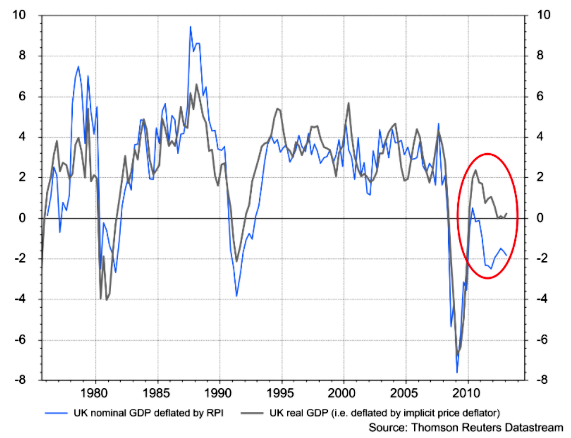The ‘secret deflator’ used to fiddle the GDP figures
Rather than use the RPI to calculate GDP, the government uses its own ‘secret deflator’. And that gives a completely different view of the economy.

Get the latest financial news, insights and expert analysis from our award-winning MoneyWeek team, to help you understand what really matters when it comes to your finances.
You are now subscribed
Your newsletter sign-up was successful
Want to add more newsletters?

Twice daily
MoneyWeek
Get the latest financial news, insights and expert analysis from our award-winning MoneyWeek team, to help you understand what really matters when it comes to your finances.

Four times a week
Look After My Bills
Sign up to our free money-saving newsletter, filled with the latest news and expert advice to help you find the best tips and deals for managing your bills. Start saving today!
I wrote here a few weeks ago about the oddly opaque manner in which the government figures out what inflation-adjusted GDP growth in the UK is.
It doesn't use the RPI or the CPI as a representative of inflation - as you might think they would instead, it uses its own deflator. I have no idea how that is calculated, and I strongly suspect that almost no one else does either.
The key point to note is that until 2010 the RPI and the deflator were much of a muchness. But in the last few years, they have suddenly (and to my mind inexplicably) parted ways.
MoneyWeek
Subscribe to MoneyWeek today and get your first six magazine issues absolutely FREE

Sign up to Money Morning
Don't miss the latest investment and personal finances news, market analysis, plus money-saving tips with our free twice-daily newsletter
Don't miss the latest investment and personal finances news, market analysis, plus money-saving tips with our free twice-daily newsletter
James Ferguson at MacroStrategy Partners has kindly picked this point up for me and produced this chart:
Real GDP vs NGDP adjusted for RPI

If you assume that the Office for National Statistics' occult calculations for the deflator are entirely reasonable and correct, the UK has avoided a double dip recession (hooray!).
If, on the other hand, you note that the deflator and the RPI have rarely diverged in the past, and so think that using the RPI to deflate nominal GDP continues to make perfect sense, it turns out that the real economy has been contracting since 2008 (boo!).
That's not a double dip. It is a depression.
Get the latest financial news, insights and expert analysis from our award-winning MoneyWeek team, to help you understand what really matters when it comes to your finances.

-
 MoneyWeek Talks: The funds to choose in 2026
MoneyWeek Talks: The funds to choose in 2026Podcast Fidelity's Tom Stevenson reveals his top three funds for 2026 for your ISA or self-invested personal pension
-
 Three companies with deep economic moats to buy now
Three companies with deep economic moats to buy nowOpinion An economic moat can underpin a company's future returns. Here, Imran Sattar, portfolio manager at Edinburgh Investment Trust, selects three stocks to buy now
-
 Beating inflation takes more luck than skill – but are we about to get lucky?
Beating inflation takes more luck than skill – but are we about to get lucky?Opinion The US Federal Reserve managed to beat inflation in the 1980s. But much of that was down to pure luck. Thankfully, says Merryn Somerset Webb, the Bank of England may be about to get lucky.
-
 Rishi Sunak can’t fix all our problems – so why try?
Rishi Sunak can’t fix all our problems – so why try?Opinion Rishi Sunak’s Spring Statement is an attempt to plaster over problems the chancellor can’t fix. So should he even bother trying, asks Merryn Somerset Webb?
-
 Young people are becoming a scarce resource – we should value them more highly
Young people are becoming a scarce resource – we should value them more highlyOpinion In the last two years adults have been bizarrely unkind to children and young people. That doesn’t bode well for the future, says Merryn Somerset Webb.
-
 Ask for a pay rise – everyone else is
Ask for a pay rise – everyone else isOpinion As inflation bites and the labour market remains tight, many of the nation's employees are asking for a pay rise. Merryn Somerset Webb explains why you should do that too.
-
 Why central banks should stick to controlling inflation
Why central banks should stick to controlling inflationOpinion The world’s central bankers are stepping out of their traditional roles and becoming much more political. That’s a mistake, says Merryn Somerset Webb.
-
 How St Ives became St Tropez as the recovery drives prices sky high
How St Ives became St Tropez as the recovery drives prices sky highOpinion Merryn Somerset Webb finds herself at the epicentre of Britain’s V-shaped recovery as pent-up demand flows straight into Cornwall’s restaurants and beaches.
-
 The real problem of Universal Basic Income (UBI)
The real problem of Universal Basic Income (UBI)Merryn's Blog April employment numbers showed 75 per cent fewer people in the US returned to employment compared to expectations. Merryn Somerset-Webb explains how excessive government support is causing a shortage of labour.
-
 Why an ageing population is not necessarily the disaster many people think it is
Why an ageing population is not necessarily the disaster many people think it isOpinion We’ve got used to the idea that an ageing population is a bad thing. But that’s not necessarily true, says Merryn Somerset Webb.